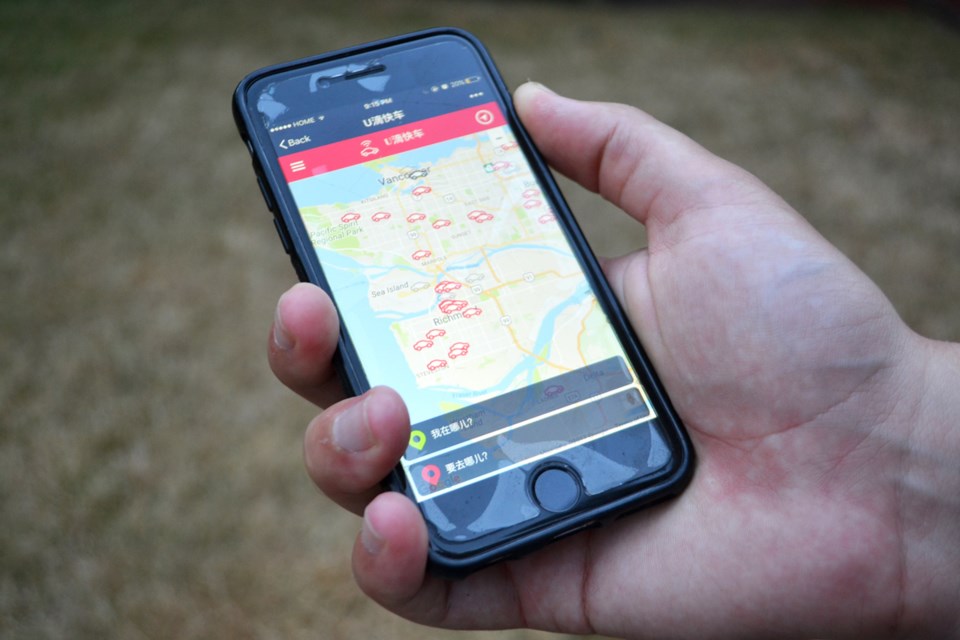An Uber-like, app-based Chinese-language company is operating in Richmond and other parts of Metro Vancouver, even though unregulated ride-hailing services are illegal in B.C.
Launched in March, Udi Kuaiche, a Chinese-language ride-sharing company, has been providing airport services and car rides in Metro Vancouver.
“Our company aims to serve everyone from the Chinese community and become the next leader in ride sharing,” writes Udi Kuaiche on its website.
However, ride-hailing services are currently illegal in B.C. Uber, a leading ride-share company, operated briefly in 2012, but was shut down by the B.C. Passenger Transportation Board.
A spokesperson for Udi Kuaiche, which operates in the shadows of the informal economy, said he’s not worried about potential legal problems.
“We are not against the law because there are no regulations for this in B.C. yet,” said Tom Chen, an executive of Udi Kuaiche. “Once the government is ready and implements a regulation system, we will apply.”
However, the City of Richmond said the lack of provincial regulations doesn’t give the car-sharing company the green light.
“We believe it is illegal to run before the province’s approval on ride-sharing services and the city will not issue them a business licence to operate in Richmond,” said city spokesman Ted Townsend. “So they are currently operating without a licence in Richmond right now.”
An undercover Richmond News reporter ordered a ride from Udi Kuaiche using the popular Chinese messaging app WeChat, a Chinese version of WhatsApp, and was picked up by a nearby driver within 10 minutes.
Orders for a ride can be made on the company’s website or app without requiring a user to register.
The driver told our reporter: “I have been doing this for a while. How much you make depends on how active you are when doing this.”
Like most other ride-hailing services, the fee for a ride on Udi Kuaiche is lower compared to a regular taxi. The latter charges approximately $16 from Bridgeport to the Richmond Olympic Oval, whereas Udi Kuaiche charges $9.
Users can pay the driver using cash or credit card, or pay in Chinese Renminbi using Wechat Pay, which is an online wallet built into WeChat.
However, the B.C. Taxi Association warns the low cost comes with potential risks.
“Commercial taxies are insured, and all the cars are inspected and maintained properly. If anything goes wrong, the customer is protected. But those car-sharing services don’t need to do any of that. Of course it’s cheaper,” said Mohan Kang, the president of B.C. Taxi Association.
“Plus, all taxi drivers have to receive official training by the Justice Institute (of B.C.) and (undergo) a criminal check by the police. Those unlicensed companies are not able to do that.”
Chen said rigorous selection and training processes are in place for all the company’s drivers, but the driver who picked up the Richmond News reporter told a different story.
“It’s very easy to become a driver,” he said, “I was referred by a friend and didn’t attend any interview or training.”
Chen admitted that while Udi Kuaiche is able to find out information about a driver’s history, the company is not mandating criminal record checks.
“During the interview, we mostly examine the driver’s attitude, driving skills and familiarity of the roads here,” Chen said.
Udi Kuaiche drivers make about $1.6 per kilometre, although the rate varies according to the region, the time of the ride and the vehicle type. The company will take around 15 per cent of that.
In B.C., the average taxi rate is about $3.32 per kilometre.
Kang said cab drivers have to pay for overhead and to lease their licence plates; however, they keep all the money they make on a trip, so their per-kilometre pay will also vary. Kang also added, all drivers are guaranteed a minimum monthly salary from the company they work for.
Meanwhile, at Udi Kuaiche, the cost of getting caught is considerably higher than a slap on the wrist.
Drivers without a passenger transportation licence who are caught picking up or riding with a passenger can be fined upwards of $1,150, according to the B.C. Ministry of Transportation.
In a statement to the Richmond News, the ministry wrote, “The ministry is aware there are some companies connecting passengers with drivers of unlicensed vehicles for hire in the Lower Mainland. An investigation into this matter is underway and given this investigation, further details about the companies or the drivers can’t be provided.”
However, the spokesperson confirmed that to date, ministry staff has issued five violation tickets to drivers.
While safety concerns are mounting over unregulated ride-sharing services, companies such as Udi Kuaiche are still high in demand.
“Our company is developing very fast. We have had about a 30-per-cent increase every month since it was launched (in March) and now there are over 300 registered drivers. A lot of our customers are in Richmond,” said Chen.
Racoon Go, another Chinese language ride-sharing service created by a Simon Fraser University student, has also been operating since last year.
The provincial NDP, set to form government with the Green party, said it will bring ride-sharing to B.C. as early as May 2018.



